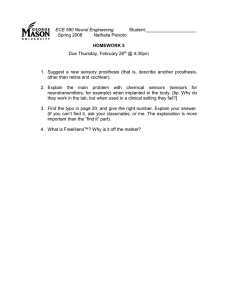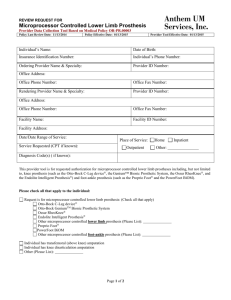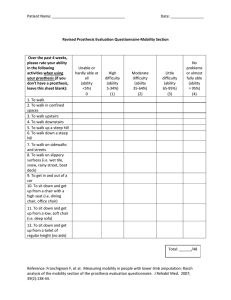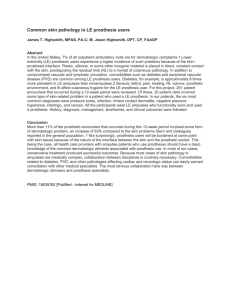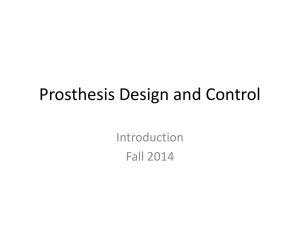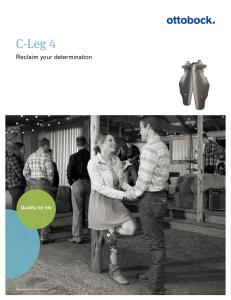Trusting the next step.
advertisement
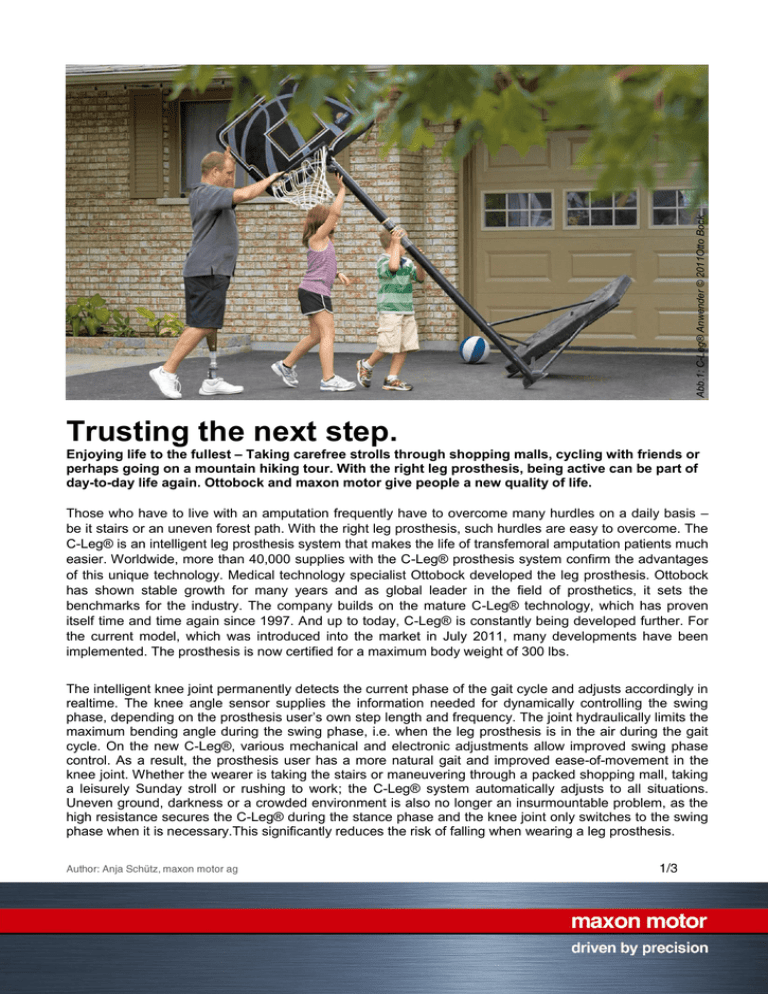
Abb.1: C-Leg® Anwender © 2011Otto Bock Trusting the next step. Enjoying life to the fullest – Taking carefree strolls through shopping malls, cycling with friends or perhaps going on a mountain hiking tour. With the right leg prosthesis, being active can be part of day-to-day life again. Ottobock and maxon motor give people a new quality of life. Those who have to live with an amputation frequently have to overcome many hurdles on a daily basis – be it stairs or an uneven forest path. With the right leg prosthesis, such hurdles are easy to overcome. The C-Leg® is an intelligent leg prosthesis system that makes the life of transfemoral amputation patients much easier. Worldwide, more than 40,000 supplies with the C-Leg® prosthesis system confirm the advantages of this unique technology. Medical technology specialist Ottobock developed the leg prosthesis. Ottobock has shown stable growth for many years and as global leader in the field of prosthetics, it sets the benchmarks for the industry. The company builds on the mature C-Leg® technology, which has proven itself time and time again since 1997. And up to today, C-Leg® is constantly being developed further. For the current model, which was introduced into the market in July 2011, many developments have been implemented. The prosthesis is now certified for a maximum body weight of 300 lbs. The intelligent knee joint permanently detects the current phase of the gait cycle and adjusts accordingly in realtime. The knee angle sensor supplies the information needed for dynamically controlling the swing phase, depending on the prosthesis user’s own step length and frequency. The joint hydraulically limits the maximum bending angle during the swing phase, i.e. when the leg prosthesis is in the air during the gait cycle. On the new C-Leg®, various mechanical and electronic adjustments allow improved swing phase control. As a result, the prosthesis user has a more natural gait and improved ease-of-movement in the knee joint. Whether the wearer is taking the stairs or maneuvering through a packed shopping mall, taking a leisurely Sunday stroll or rushing to work; the C-Leg® system automatically adjusts to all situations. Uneven ground, darkness or a crowded environment is also no longer an insurmountable problem, as the high resistance secures the C-Leg® during the stance phase and the knee joint only switches to the swing phase when it is necessary.This significantly reduces the risk of falling when wearing a leg prosthesis. March 15, 2012 The C-Leg® also offers a special mode that allows it to be configured for various activities such as crosscountry skiing or cycling. In this additional activity mode, the amount of hydraulic dampening depends on the knee angle. The initial dampening and the progression can be configured individually. Thus the behavior of the leg prosthesis can be programmed for diverse activities beyond normal walking. To enable the prosthesis to withstand the stress to which it is subjected daily, the high-activity frame of the prosthesis is made of carbon, an extremely stable, high-quality and light material. The frame covers the electronics, the hydraulics and the battery. What is behind it? How exactly does the C-Leg® technology work? The intelligent controller of the prosthetic system adapts to the individual gait of each individual. The control operations are performed via a microprocessor-controlled hydraulic unit that dynamically adjusts the system to all gait speeds. Simultaneously the controller ensures that the prosthesis is reliably secured during the stance phase. This tried-and-tested control mechanism is achieved by means of a complex sensor system. The sensors record the load every 0.02 seconds, or, to be more precise, the sensors measure the ankle moments above the foot fitting component, as well as the angle and angle speed of the knee joint. Thus the knee joint permanently detects the current gait phase of the prosthesis wearer. A lithium ion battery powers the C-Leg® and lasts approximately 48 hours. Small motor, large effect The characteristics of the hydraulics are adapted by means of two valves. These valves are adjusted by maxon RE10 DC motors. Two motors are used in each CLeg®. Here one of the main strengths of the RE10 is its compact size. With a diameter of just 10 mm, the motor is the second-smallest DC motor in maxon motor's portfolio. This, combined with the CLL system for a long service life, played an important part in Ottobock's decision to use these high-precision motors. The motors furthermore have ironless windings and neodymium magnets that allow top performance at a minimum size. Precious-metal brushes are used for mechanical commutation of the motors. This ensures detent-free running of the maxon motors, even at low speeds. During commutation using brushes, contacts are constantly opened and closed via the inductive load of individual segments of the motor winding. The sparks generated when the contacts open attack the metal brushes and commutator of the motor, by melting the surface. This "brush fire" reduces the life span of the commutation system of the motor. By means of the capacitors integrated in the motors, the life span is significantly increased. The CLL principle (capacitor long life) means that an additional element is inserted between two adjacent commutator segments, i.e. parallel to the opening contact. Through the use of the CLL concept, the brush fire is largely suppressed. Furthermore the spark reduction also has a positive influence on the electromagnetic radiation. In the C-Leg®, the maxon motors have to operate in pulse mode or intermittent mode, i.e. the motor is only activated for a short period for adjustments and is not constantly in use. Ottobock estimates that 9 million such adjustments are made during the life span of the C-Leg®. On average, the motor performs 10 rotations for these adjustments. Taking a stand in life - on both legs For many leg amputees, using the C-Leg® is a completely new experience. Contrary to other prostheses, the user of C-Leg ® do not have to concentrate on every step. "It is not exhausting at all, it is impressively simple and I was really surprised. Now walking is fun again - almost like it used to be," says Ed from America, who lost his leg in a car accident but has nevertheless been standing in a bakery for many years. The success story of the C-Leg® continues as more and more people are switching to this intelligent leg prosthesis and are achieving amazing things with it. In 2011, 74-year old Roland Zahn crossed Germany on foot, from Leipzig to Tübingen – with his C-Leg® as trustworthy companion. And a 60-year old woman climbed in the Himalayas at altitudes up to 4000 m with her prosthesis. Author: Anja Schütz, maxon motor ag March 15, 2012 Ed's C-Leg story. Author: Anja Schütz, Editor, maxon motor ag (6774 characters, 1100 words, 6 figures) For additional information, contact: maxon motor ag Brünigstrasse 220 Postfach 263 CH-6072 Sachseln Otto Bock Healthcare Products GmbH Kaiserstrasse 39 A–1070 Wien Telephone Fax Web Telephone Fax Web +41 41 666 15 00 +41 41 666 16 50 www.maxonmotor.com Author: Anja Schütz, maxon motor ag +43 1 5233786 +43 1 5232264 www.ottobock.at
